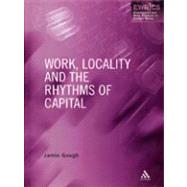Work, Locality and the Rhythms of Capital
, by Gough,Jamie- ISBN: 9780826462848 | 0826462847
- Cover: Hardcover
- Copyright: 4/28/2001
This book undertakes a theoretical and empirical investigation of relations between waged work, spaces of production, and the unstable dynamics of capitalist investment. The center of the study is the workplace labor process, comprising tasks, technologies, work intensity, divisions of labor, employment of segments of the labor force, and industrial relations. Systematic comparison of the dynamics of a range of different labor processes is undertaken - a novel methodology. Workplace change is situated within its locality, and the labor process is related to labor forces and their reproduction, to local cultures and built environments. Analysis of the labor process is broadened in another direction by considering its reciprocal relations to products, their consumption, and the surplus profits which they can reap. Changes in work organization and products are in turn set within industry competition and spatial uneven development. Labor process change is shown to be integrally bound up with stasis orchange in the location of the workplace. A further thread of the argument relates labor process change to the roller-coaster rhythms of capitalist investment, the self-propelling upward and downward trajectories of investment within workplaces, local industries, local economies and - in the business cycle - national and international economies. In this way the book explores the intertwining of the uneven spatiality and unstable temporality of capitalist production. The book is based on a detailed case study of factories in London in 1976-81, the beginning of the period of neoliberal restructuring. The study is set within a history of the diverse work cultures of London manufacturing and waves of investment within it. The book thus explores the contradictions and divisions characteristic of metropolitan economies. An overarching concern of the book is the political fragmentation of labor. It explores both the differences and commonalities in workers' identities and experiences of change withintheir workplaces, and the pressures created by spatial flows of capital, and how these construct barriers to, but also possibilities for, collective action. The book concludes with a discussion of strategies which could overcome these divisions among workers. The book makes original contributions to labor process theory, industrial and economic geography, methods of analyzing territorial economies, our understanding of the business cycle, the literature on metropolises, and debates on socialist strategy.






